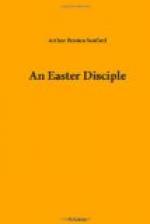“It cannot be,” continues Aulus. “that your heart’s love is involved. When our military movements bring the Roman knights to Palaestina, in their pride of birth they do not wed the black-eyed daughters of the Jews. On your earlier expedition to Egypt you met a princess of the land, but were not let to espouse that swarthy maiden of the Nile. The reward of love cannot be the experience of which the augur spoke at Brundisium.”
“Not so,” says Quintus in response; “as I was leaving Rome, it was the beautiful Lucretia who sent me forth with her rare farewell. For my return from Palaestina she is now waiting; and under the blue skies of Italia we are to wed. I have been wondering,” Quintus adds further, “if the augur, watching the flight of birds there at Brundisium. could mean that I am to fall by death, here in Palaestina. We have not come for battle, but to guard the peace. Yet it is easy for Atropos, that cruel fate, to clip the slender thread of life and send men on to die land of shades. If this was what the augur meant, no Roman in the days of Tiberius has ever set forth upon a more serious adventure.”
“You are given to melancholy, this autumn afternoon, my comrade Quintus,” the other says; “you are feeling that sadness which comes to men when the Dryads move over the earth and touch the leaves into crimson and gold and brown.”
“Not so,” answers Quintus; “but I am remembering that I have come into a land where a strange Teacher is speaking to men of a future life. Yet are men to live again? I have seen the marble tombs on the Appia Via where the Scipios, the Metelli, and so many more of our great Romans lie asleep. Shall I soon follow them? Is it an endless slumber? What is it that the new Rabbi from Nazareth means, when in the city yonder he speaks of another life?”
“A fig for your weird autumn fancy,” responds Aulus; “down to the streets of Hierosolyma we will go, and among their novel sights we will forget your serious meditations.”
They walk that afternoon as sightseers through the crowded Jewish emporium. The shops remind them, with all their contrasts, of the marts of Rome, for men always and everywhere have the trader’s passion. In the narrow streets of Jerusalem they see the stir of many activities. The workman is hammering his brass; the shoemaker shapes his sandals; the flax spinner is winding his thread; the scribe sits on his mat, and is ready for his writing. In the shops they see costly merchandise for sale—silks and jewels, fine linens and perfumes, delicious foods and drinks. These have been imported from far Arabia and India; they have been brought from distant Persia and Media. With all their variety, no taste, however fitful, need go unsatisfied.
What a motley crowd is on the streets! They hear the Aramaic speech of Palestine, which Quintus has been taught by his Athenian tutor, and their ears also catch the accents of other foreign tongues. They meet traders from western Zidon, sailors from Crete, bearded Idumaeans from beyond Judaea, and scholars from far Alexandria. Magnificent Jerusalem it is! Yet destined soon to fall. For the day draws near when the Roman Titus shall weep on Scopus over its fading splendors and then shall smite it to the dust.




